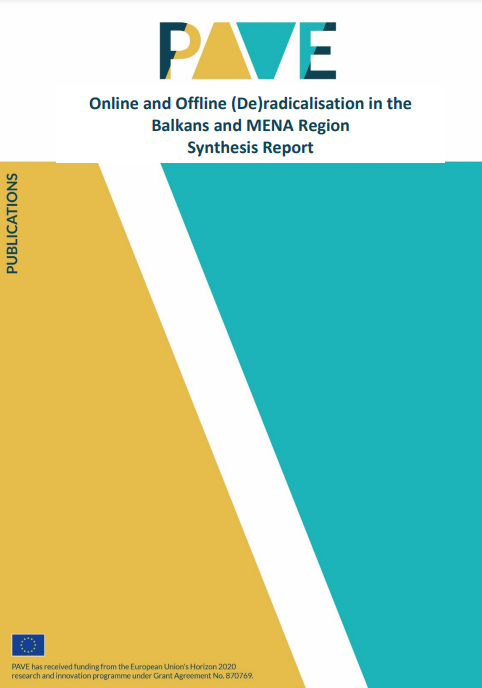15/06/2022

Qendra Kosovare për Studime të Sigurisë (QKSS)
PAVE Project
Ramadan Ilazi & Ardit Orana
Vërejtje: Për momentin ky publikim gjendet vetëm në gjuhën shqipe.
This paper provides a synthesis of studies on vulnerability and resilience of communities to religious and ethno-political radicalisation in the Western Balkans (WB) and Middle East and North Africa (MENA), with a focus on Kosovo and North Macedonia, and Tunisia and Lebanon, respectively. It summarizes findings of the country studies which assess the overall situation and trends in each of them with regard to ethno-political and religious radicalisation.
It also discusses some empirical findings and community perspectives in specific fieldwork areas in each country. The third argument discusses the role that political isolation, constraints to political participation and ethnical or confessional segregation could play in ethno-political or religious radicalisation at the level of countries, societies and communities. A fourth argument discusses how socio-economic challenges such as poverty and social marginalisation makes the four societies and states studied more vulnerable to ethno-political and religious radicalisation.
A fifth argument focusses on the role of government institutions in preventing and tackling radicalisation in its various dimensions and what this could imply for societies’ vulnerability to this phenomenon. The final argument focuses on the role of media as a societal agency and political actor in radicalisation and how this could affect societies’ vulnerability to this phenomenon. In relation to gender (a)symmetries, the PAVE research has found several overarching themes in the WB and MENA regions. A common denominator shared among the Western Balkans and MENA regions is that due to somewhat similar levels of patriarchal modes of social organization, the role of women in relation to P/CVE has been viewed disproportionately differently from the male-centred approaches to radicalisation among local communities.
A main difference noted among the regions, however, is that the despite the level of patriarchy, the Western Balkans communities have underscored the important roles women have in local communities in relation to P/CVE. In the case of the MENA region, women are thought to be completely absent from any roles in relation to (de)radicalisation trends and impacting of community level resilience and vulnerability factors. A similar discrepancy is also evident at the level of perceptions to online (de)radicalisation. While Western Balkans communities have been subject to women-targeted radical narratives through various online channels, there is a clear lack of data or linkage in the case of the MENA region due to the absent role of women in both offline and online (de)radicalisation processes.
The findings of this paper draw from the four country reports that have been prepared by partner organizations in the framework of the working package 5 on online and offline (de) radicalisation: respectively, the country report on Kosovo prepared by Kosovar Centre for Security Studies (Ramadan Ilazi, Ardit Orana and Teuta Avdimetaj); the country report on North Macedonia prepared by Hellenic Foundation for European and Foreign Policy (ELIAMEP) (Bledar Feta, Ana Krstinovska, Yorgos Christidis and Ioannis Armakolas); the country reports on Tunisia and Lebanon prepared by Sfax University and Berghof Foundation (Faiza Ayed, Lara Azzam, Zouheir Ben Jannet, Sadok Damak, Maria El-Sammak, Samiha Hamdi, Fethi Rekik, Youssef Salloum). Accordingly, this synthesisreport is solely based on these country reports and any work used in this report is based on the country reports of the respective authors as detailed above. Footnotes are used in some cases to provide context. In addition to the introduction and conclusions, this paper consists of five sections.
Section 2 focuses on vulnerability and resilience of communities in the four countries to ethno-political and religious radicalisation. Taking into account similarities and differences between the two regions and individual Online and Offline (De)radicalisation in the Balkans and MENA Region Synthesis Report 6 countries discussed in respective country studies, this section makes six arguments. The first one discusses differences and similarities between them in terms of vulnerability of their societies to ethno-political and religious radicalisation. The second argument discusses the repercussions of unresolved political issues in vulnerability to radicalisation, as well as to what extent and how such repercussions could unfold.
This paper is published in the framework of PAVE Project supported by European Union Horizon2020 research and innovation programme under Grant Agreement 870769. This publication is part of WP5 of the PAVE project, led by Kosovar Centre for Security Studies, the authors are solely responsible for its content, it does not represent the opinion of the European Commission and the Commission is not responsible for any use that might be made of data appearing therein.